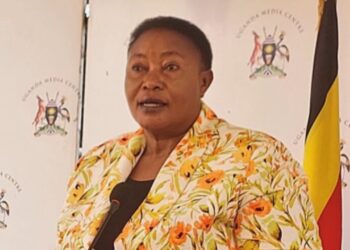By Leonard Kamugisha Akida,
KAMPALA
Youth leaders across Uganda have voiced strong opposition to a government proposal seeking to restrict appointments to District and City Service Commissions to only retired professionals, describing the move as discriminatory and unjustified.
Speaking to journalists at the Forum for Democratic Change (FDC) party headquarters in Najjanankumbi on Friday, youth leaders under the Multiparty Youth Forum (MYF) demanded a formal explanation from the government, accusing it of plotting to push young people out of local government employment.

The contentious proposal, spearheaded by the Directorate of Ethics and Integrity (DEI), forms part of a broader strategy to curb corruption in public service recruitment. According to DEI, the measure is aimed at mitigating bribery and favoritism in recruitment processes, which it claims are largely orchestrated by youthful officials who “sell jobs to the highest bidders.”
The plan, developed in conjunction with other anti-corruption agencies, is awaiting legislative amendments to the Local Government Act by the Ministry of Local Government. Once finalized, it will be tabled before Cabinet by the Minister of Ethics and Integrity.
However, the youth leaders have categorically rejected the proposal, arguing that it unfairly targets the youth without evidence. They cited recent major corruption scandals—such as the Karamoja iron sheets scandal and the Bank of Uganda currency saga—which involved senior officials, not youth.
Lynnet Nanyonjo, the MYF Chairperson, called on the DEI to produce empirical evidence linking youth to corruption in public service.
“We urge the Directorate of Ethics to conduct research-based analysis rather than relying on speculations and self-serving intentions. We request the release of statistics to substantiate these claims,” said Nanyonjo.

Francis Adepo, FDC National Youth President, dismissed the move as a politically motivated smear campaign against young Ugandans.
“It’s completely sugarcoated to paint a bad picture of young people who are getting more organized to take over governance in this country,” Adepo said. “This unfair blame and treatment of the young people should not even be entertained for a second.”
He further criticized the alleged research behind the proposal, questioning its credibility and accusing the DEI of attempting to shield older officials from scrutiny while scapegoating the youth.
“The minister recently said the most corrupt people are aged 60 years and above. So unless the definition of youth has changed to mean 60 and above, this research is clearly misleading,” he added.
The youth leaders said the proposed changes threaten to exclude the young generation from national development, arguing that they have already been sidelined in various public service opportunities. They also called on their peers countrywide to rise and safeguard their constitutional right to employment.
“Any attempt to undermine the youth is a direct attack on the country’s future,” they said in a joint statement. “We are the generation born in promises and raised in patience. After 40 years, youths, we must rise, not with anger, but with purpose. It’s time to reclaim our dreams. Uganda’s future is calling. Will you answer?”
As the debate over youth participation in governance intensifies, the Ministry of Ethics and Integrity is yet to issue an official response to the growing dissent







































